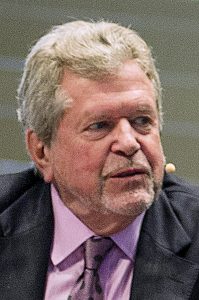The Middle East is a desert.
A few thousand years ago, two cradles of civilization — Mesopotamia and Egypt — grew from its sands. The nectar of their success could be attributed to three great rivers: the Tigris, the Euphrates and the Nile. And according to Geoffrey Kemp, director of Regional Strategic Programs at the Center for the National Interest, if something happens to those rivers, those civil entities will cease to exist, devolving to fine dirt and dust once again.

Dennis Ross and Geoffrey Kemp discuss the current Israeli-Gaza conflict and the role other countries can play in trying to negotiate peace talks at the morning lecture Wednesday, Auguat 13, 2014.
Now anything but civil, the Fertile Crescent is presently afflicted by war, drought and dissension. And at 3:30 p.m. Wednesday in the Hall of Philosophy, Kemp will deliver the first lecture in his annual “Middle East Update” on the matter and its contingencies, titled “The Middle East and Climate Change.”
Kemp’s knowledge and experience on the subject and its relevancy is formidable. Steeped heavily in the dealings of arms trafficking and international affairs, he has a special lens for the Middle East and United States security. With a Ph.D. in political science, his career has spanned the horizons of high-tier academia all the way to the Reagan White House. He also happens to be British.
But Kemp lives, eats and breathes the Middle East.
Wednesday, Kemp will deliberate on the amalgamation of global warming, rising sea levels and the worst recorded drought in the last 900 years, and how the acceleration of those real environmental issues are dramatically disturbing the existence and livelihoods of the countries and peoples occupying these areas.
He’ll specifically spotlight the civil war oppressing Syria.
“These are issues that are real, but no one talks about on a day-to-day basis,” Kemp said. “The effects of drought and food insecurity is one, if not the only, of the key elements that’s driven this war. Everything’s linked to everything else. You have droughts, therefore you don’t have agriculture. Don’t have agriculture, people move. When they move, they move into areas where people don’t want them. And that’s where the fighting begins.”
Despite all the atrocities and bedlam shocking the region, both historically and presently, Kemp will also talk about the progress being made.
One of great significance is a sophisticated water preservation technology constructed by the Israelis. It utilizes Mediterranean seawater and converts it into potable water. The tool has been used by the government of Israel as an olive branch of sorts toward some of its formerly antagonistic neighbors. Kemp said it has yet to solve all the problems, but it’s a big first step.
“The irony is one of the areas of the Middle East where there is some cooperation, at last, concerns the Jordanians, the Israelis and the Palestinians,” Kemp said. “They are working closer together than they ever have, and you’re beginning to see some success.”




